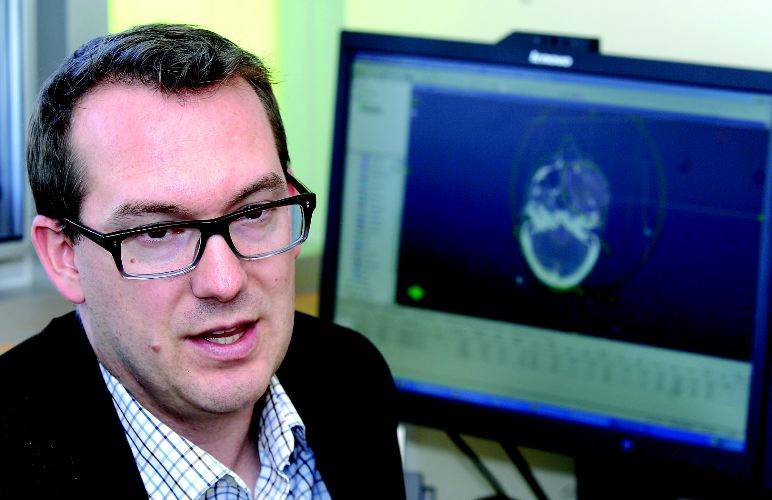When Karl Weber first found out he was eligible for a new clinical trial to treat his lung cancer, he was unsure whether or not to participate.
"I hemmed and hawed," the 56-year-old from Prince George said. "Then I thought of my dad because he did clinical trial experiments too, because he had cancer. I agreed to it, if it can benefit somebody else - or me - let's do it."
Weber is the first patient in B.C. to take part the trial, which is also taking place in London, Ont., and Amsterdam. Its aim to find out whether high doses of a new form of radiation treatment, known as stereotactic ablative radiotherapy (SABR), is effective in treating secondary cancer sites.
"It's a relatively new technique that we just started using for treating primary cancers," said Dr. Rob Olson, the principal investigator in B.C. "We're wondering now that we have this tool, can we use it in places that have actually had cancer spread?"
The researchers will be looking at how effective the therapy is at treating the secondary cancer as well as how it effects the quality of life and life expectancy of the patients involved.
Cancer first materialized in Weber's face in the form of a large growth two years ago. He received radiation as part of his treatment protocol back then for that disease and responded well. Now cancer has spread to his lungs, but because it's localized to one spot he's eligible to take part in the trial.
Over the next four years the researchers hope to have 99 patients enter the program. Some, like Weber, will receive the SABR treatment, while others will get standard care. Currently standard care for a patient in Weber's condition could range from doing nothing as long as there are no symptoms, to chemotherapy to low-dose palliative radiation.
Weber went to Vancouver last month to receive his radiation treatment and the results will be known in a couple of months when he'll receive a CT scan to see if the cancer has spread.
"We gave such a high dose, it will probably get rid of his tumour," Olson said. "But the question is, will it make him live longer? Will it improve his quality of life?"
The treatment itself went well, Weber said he didn't feel any side effects at the time. In part that was due to the location of the tumour in his lung - it's not close to any nerve fibres.
"I wasn't sick or anything," he said.
Any future patients in the north will be able to get their treatment closer to home as the B.C. Cancer Agency Centre for the North will be able to perform the SABR treatments when it officially opens in the coming weeks.
Weber's father lived with cancer for 10 years, but died five years ago. Weber said his father participated in studies for the final five years of his disease and found it useful. Now Weber has the chance to pay it forward by taking part in a study himself.
"If somebody doesn't do it, how are you going to learn?" Weber said. "I think it's important that everyone steps up."
When Weber first signed on to participate, he didn't know which group he'd be placed in. He was OK with that, and was willing to go the standard course of treatment if that's what the randomization program selected.
Doctors must only recommend patients for whom the benefits of the SABR treatment is unknown.
"If I thought it would help him, I shouldn't put him on the study, I should give him the treatment; if I thought it would harm him, then I shouldn't put him on the study," Olson said. "But I actually don't know if this is going to be the right thing or not, that's why it should be studied."
In B.C., Olson is targeting 10 patients over four years and he's well on his way to meeting it. In addition to Weber, one patient from Vancouver and another from Vancouver Island have also signed on.
Olson, who works out of Prince George, said clinical trials should take places in all areas of the province and said this study is an important first step.
"Karl wouldn't have had [the option to pariticipate] if we weren't here, nobody would have thought of it," Olson said. "II think it's a really big deal, letting people try new things and be part of it."
He said Canada is well placed to do this type of study because of the lack of private radiology clinics. In other countries, like the United States, private clinics are already offering SABR treatments for secondary cancers, despite the fact no tests have been done on its effectiveness.
"I'm not saying that's completely wrong, but unfortunately if you do that, we'll never actually know if it's useful," Olson said. "That's happened in a lot in medicine, people adopt new things and we never tested them and then we lose the opportunity to test them."



